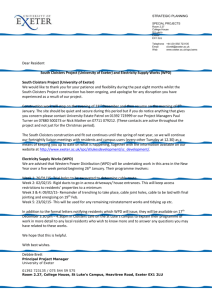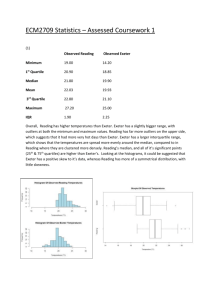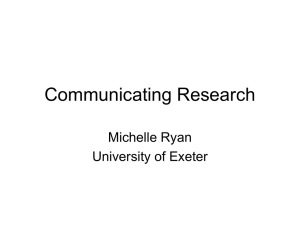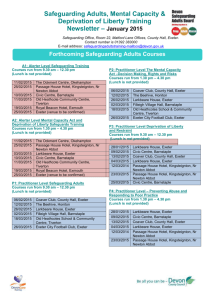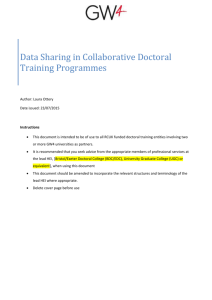file - BioMed Central
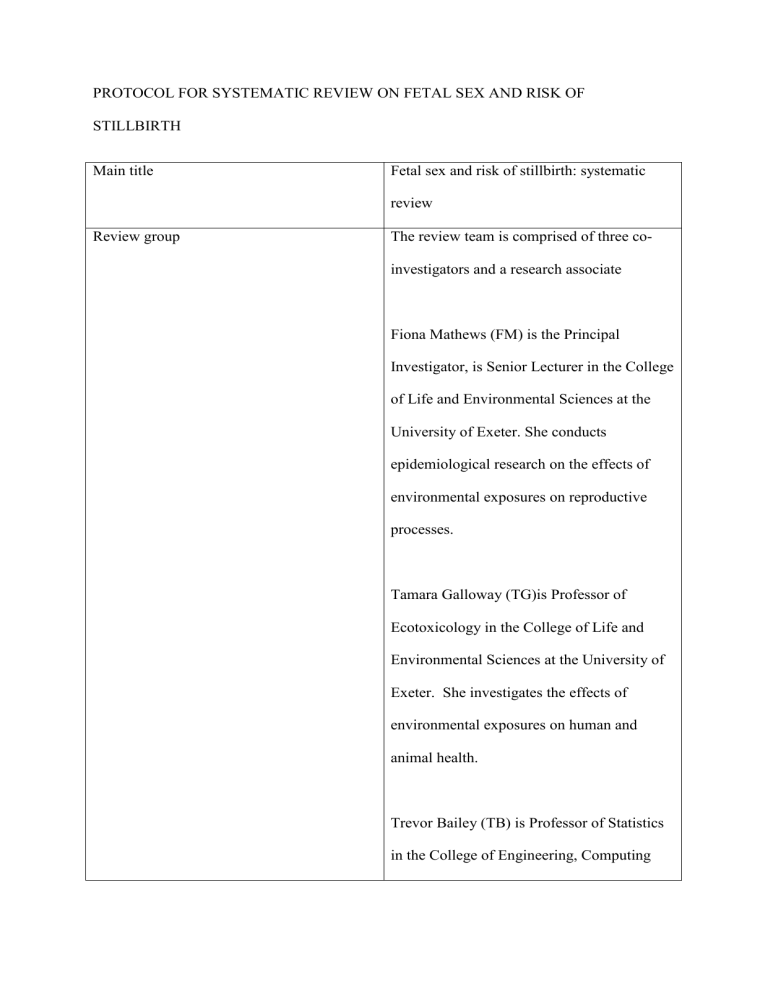
PROTOCOL FOR SYSTEMATIC REVIEW ON FETAL SEX AND RISK OF
STILLBIRTH
Main title
Review group
Fetal sex and risk of stillbirth: systematic review
The review team is comprised of three coinvestigators and a research associate
Fiona Mathews (FM) is the Principal
Investigator, is Senior Lecturer in the College of Life and Environmental Sciences at the
University of Exeter. She conducts epidemiological research on the effects of environmental exposures on reproductive processes.
Tamara Galloway (TG)is Professor of
Ecotoxicology in the College of Life and
Environmental Sciences at the University of
Exeter. She investigates the effects of environmental exposures on human and animal health.
Trevor Bailey (TB) is Professor of Statistics in the College of Engineering, Computing
Institutional base
Authors (Contact details) and Mathematics at the University of Exeter.
His interests are in applied statistical modelling and spatial and environmental epidemiology.
Debapriya Mondal (DM) is the research associate with PHD in Health Risk
Assessment.
DM and FM are responsible for acquiring the data, reviewing the published studies and performing the analyses. TG and TB will be responsible for providing guidance on analytical approaches and for reviewing and revising the systematic review.
University of Exeter
Dr Fiona Mathews (Principal Investigator)
Senior Lecturer in Mammalian Biology
& Programme Director for BSc. in Biology and Animal Behaviour
University of Exeter
Hatherly Laboratories
Prince of Wales Road
Exeter EX4 4PS tel 0(44) 1392 263406 mobile 07977 137421
email f.mathews@exeter.ac.uk
Professor Tamara S Galloway (Coinvestigator)
College of Life and Environmental Sciences
Geoffrey Pope Building
Stocker Road
Exeter EX4 4QD tel 0(44) 1392 263436 mobile 0771 778 2774 fax 0(44) 1392 263700 email t.s.galloway@exeter.ac.uk
Professor Trevor Bailey
Associate Dean for Education
College of Engineering, Mathematical and
Physical Sciences
University of Exeter
EX4 4QS, UK tel 0(44) 1392 725223 email: t.c.bailey@exeter.ac.uk
Dr Debapriya Mondal(Research Associate)
Associate Research Fellow
College of Life & Environmental Sciences
University of Exeter
Registry number for systematic review
Conflict of interest
Acknowledgements
Background
Hatherly Laboratories
Exeter EX4 4PS
Mobile-07952314201 email d.mondal@exeter.ac.uk
N/A
None
The project is funded by The Wellcome Trust
Aim and rational for project
As adults, males have higher morbidity and premature mortality than females. They also appear at greater at risk during intrauterine and neonatal life. Our objective in this
Wellcome-Trust funded research project is to quantify the degree of excess risk to males across several linked outcomes in early life. By undertaking a cohesive examination of existing literature and databases, the work will identify the extent of gender imbalances and examine whether these are are increasing or static, and whether patterns are consistent across countries.
Objective of review of stillbirth
The overall objective is to perform a systematic review of published studies to investigate the impact of male gender on stillbirth, and to summarise the effect size using meta-analysis.
Method
Identification of potential studies: Search strategy
1.
The search will be run in Medline on the Ovid platform and Web of Science on the
Thomson Gale platform
2.
Only published literature in English from 1990 will be considered
3.
The search terms will be
Stillbirth/
Fetal death/
Foetal death/
Pregnancy loss/ and sex/ fetal sex/ foetal sex/ gender
4. Citations identified from electronic searches will be downloaded to a Reference
Manager database. Abstracts will be screened for relevance and full copies of studies that may meet the inclusion criteria will be obtained. Reference lists of relevant systematic reviews and of included studies will also be screened for potentially relevant primary
studies. Authors will be contacted for further information or relevant unpublished data where necessary.
Inclusion and exclusion criteria
1. Type of measure
Inclusion:
1.
Studies providing numbers of stillbirths and the numbers of live births or total births stratified by sex will be included
2.
Studies providing information such as un-adjusted odds ratios from which the relevant numbers of stillbirths and the numbers of live births can be estimated for both males and females will be included
Exclusion:
1.
Studies from which a cross-tabulation of numbers of live-births and stillbirths by gender will be excluded
2. Method
Inclusion:
1.
Original epidemiological observational studies (including Case-Control or Cohort studies, and cross-sectional reports of populations) with described study design will be included.
Exclusion:
1.
Those with incomplete definitions of, or missing data on the population or study design will be excluded.
2.
Studies with missing or incomplete, definitions of exposure (gender) or outcome
(live- or stillbirth) will be excluded.
3.
Randomised controlled trials of interventions targeting stillbirth and neonatal mortality
Screening studies
Inclusion and exclusion criteria will be applied first to abstracts and then to full manuscripts.
Full manuscripts will be obtained for those studies where the abstract appears to meet the criteria or where there is insufficient information to be certain about excluding them. The inclusion and exclusion criteria will be re-applied to the full manuscripts and those that do not meet the criteria will be excluded.
Characterising the studies
The included studies will be characterised based on year of study, population type, study design and definition used for stillbirth. A data extraction form will be developed and the data extracted relevant to study characteristics will be summarised. The form will be piloted by
DM and FM and any necessary amendments will be discussed to make modifications to the form if required.
Quality assurance process
Data will be extracted by DM and checked by FM. Any disagreements will be resolved by discussion, and if necessary by discussing with others in the team. Where data are not available in the published report, the authors will be contacted for the missing information.
Where relevant data is not available or the author not contactable, then the data will be assessed qualitatively.
Methodological quality of included studies will be assessed considering study design, selection bias, confounders, data collection methods, withdrawals and dropouts, and integrity of the study method. Two reviewers (DM and FM) will assess quality of studies independently. Any disagreements in quality ratings will be resolved by discussion.
Process of synthesis
All studies will be included in the synthesis, according to the inclusion and exclusion criteria identified in previous sections. The outcome data will be stillbirths and live-births stratified by sex into a 2 x 2 table for each study.
The primary analyses will examine the output using meta-analysis methods (fixed and random effect models; the choice of appropriate model being influenced by the heterogeneity of the studies) and appropriate graphical methods (forest plots).We will explore heterogeneity using quantitative measure (I-square statistics) and graphical measures (funnel plot) and confounding effects will be looked by performing secondary analyses using subgroup or sensitivity analysis
Deriving conclusions
We will use a participatory means of drawing inferences and conclusions from our results. In order to do so, preliminary findings will be synthesised and integrated as a report by DM and
FM and circulated to TG and TB. The final conclusions will result from debate and discussion within the team. We will then share the findings as a manuscript publish in a reputed journal

